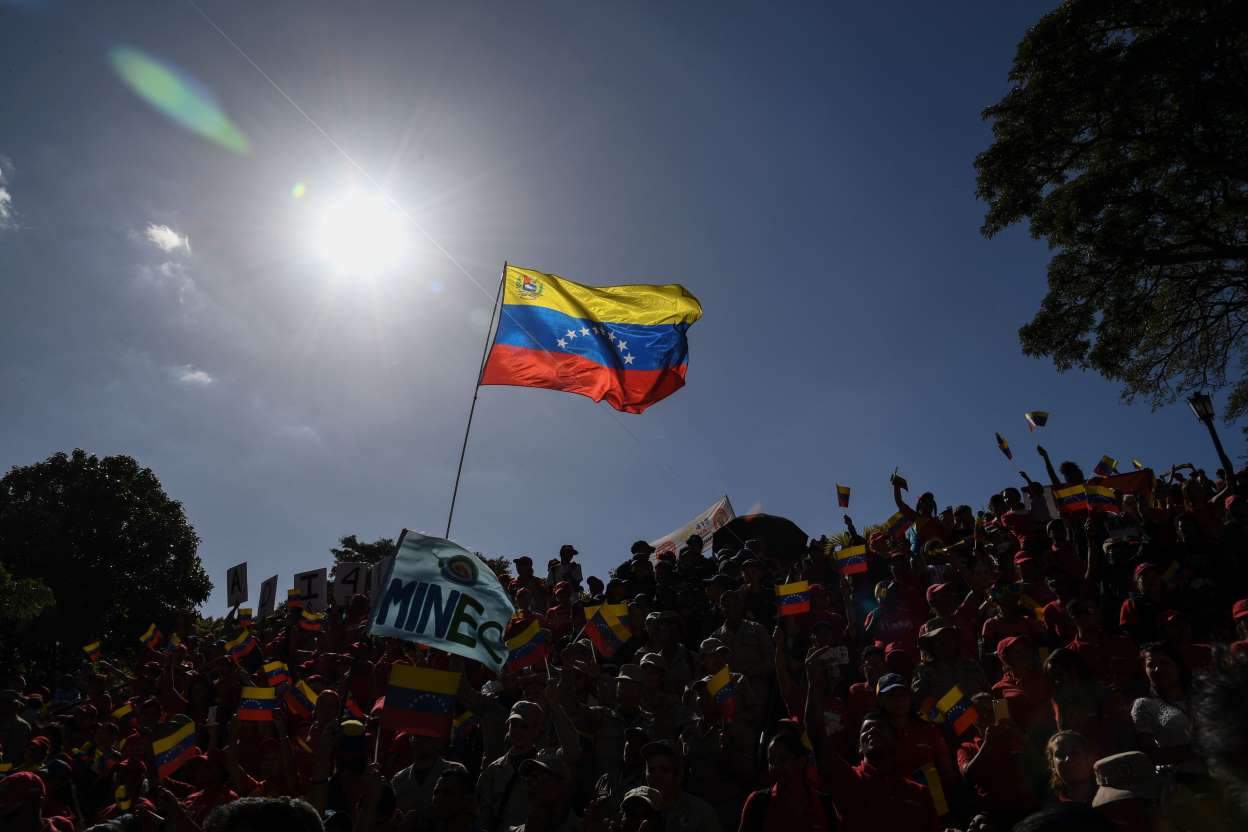U.S. Attacks Venezuela Human Rights Record After U.N. Condemns Sanctions

The United States has released an annual human rights report that criticizes alleged abuses in Venezuela, which is subject to strict U.S. sanctions criticized by the United Nations a day earlier.
The State Department published the 2019 Country Reports on Human Rights Practices on Wednesday, detailing the records of nations across the globe and especially focusing on criticisms of adversarial governments. In Venezuela, the U.S. has disavowed President Nicolás Maduro for over a year and has instead backed Juan Guaidó, leader of the opposition-controlled National Assembly. In addition, President Donald Trump's administration has accused the ruling socialist administration of illegally suppressing Guaidó's authority.
"Former president Maduro, with the backing of hundreds of Cuban security force members, refused to cede control over the instruments of state power, preventing interim president Guaidó from exercising authority within the country," the State Department report reads.
The document goes on to accuse the Venezuelan government of conducting arbitrary arrests and extrajudicial killings, and of holding "a preference for using legal proceedings, financial sanctions, and administrative actions against unfavorable news outlets." On Tuesday, U.N. High Commissioner for Human Rights Michelle Bachelet also condemned a number of the Maduro administration's political practices, but she targeted sanctions imposed by Washington.
"With regard to economic and social rights, the imposition of new economic sanctions is concerning, notably those affecting airline Conviasa, as well as sanctions on the oil industry, which reduce the government's resources for social spending," Bachelet said. "Despite exceptions to allow imports of medicines, food and humanitarian supplies, public services and the general population continue to suffer from the impact of over-compliance from the financial sector."
Venezuela's oil-bound economy peaked just before Maduro's predecessor, United Socialist Party founder Hugo Chávez, died in office in 2013. Since then, the country's gross domestic product has substantially declined, briefly rebounding before the beginning of another sharp downward spiral in 2017, the year Trump assumed office and rolled out new sanctions aimed at the Latin American country's petroleum industry.
These restrictions have been widely expanded, approaching the kind of embargo imposed on Venezuela's close ally Cuba after its communist revolution seven decades ago. Like Cuba, Venezuela has grown closer to Russia, which has held joint military drills and pledged continued military-technical cooperation, along with other assistance in defiance of U.S. policy. China and Iran have also pledged their help.
The U.S. has been joined since last January by most of Europe and the Americas in withdrawing recognition of Maduro, whose opponents have accused the government of fraud and corruption. At the same time, leftist states across the globe and other major powers, such as Turkey and South Africa, have stuck with Venezuelan government.
With the international community divided, Guaidó has failed to attain the necessary support to unseat the sitting president. Protests persist on the streets, however, and clashes continue between members of the security forces and supporters of the opposition.
Demonstrations have occurred in Washington as well, recently targeting Trump's special envoy for Venezuela, Elliott Abrams. The senior diplomat has a long history of helping U.S. administrations tackle left-wing governments in Latin America, and Abrams' record was attacked in a video posted Tuesday by protesters interrupting an event he was speaking at on behalf of the Alexander Hamilton Society.
Venezuela's government and opposition have attempted to resolve their differences diplomatically, but talks held in Norway and Barbados have unraveled. Maduro has threatened to have Guaidó arrested for inciting unrest and has detained a number of his inner circle's members. The Trump administration has threatened to retaliate if the opposition leader is captured.
Guaidó returned to Caracas last month after an international tour that included a meeting with Trump in Washington. In his first major rally since returning, he told supporters Tuesday he would address the global coronavirus pandemic. Venezuela has yet to register any confirmed cases.
That same day, Maduro accused his rival of trying to politicize the disease during a televised address. "In Venezuela, we have begun an intense period of prevention, of the protection of our country and of prevention in order to face the coronavirus," the president said.
He added the following day that the country would strive to protect health care in spite of "the most perverse imperial persecution and blockade."
Countries around the world, including some in Latin America, have registered more than 120,000 coronavirus cases, with about half of those afflicted recovering and more than 4,300 dying. During Wednesday's press conference regarding the release of the 2019 Country Reports on Human Rights Practices, the State Department's assistant secretary for the Bureau of Democracy, Human Rights and Labor, Robert Destro, said the Trump administration "will try to be useful and to provide assistance" in battling the virus, even to sanctioned countries like Iran and North Korea.
Photo: © YURI CORTEZ/AFP/Getty ImagesSupporters of Venezuelan President Nicolás Maduro shout slogans at the Miraflores Palace in Caracas to support the state-owned CONVIASA airline during a protest against the sanctions imposed days earlier by the U.S. government, on February 10. Washington has steadily tightened restrictions against the socialist leadership in Caracas since disavowing Maduro and supporting opposition leader Juan Guaidó.











